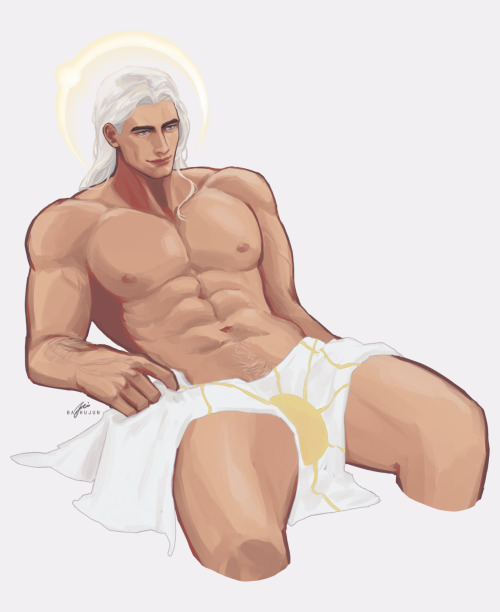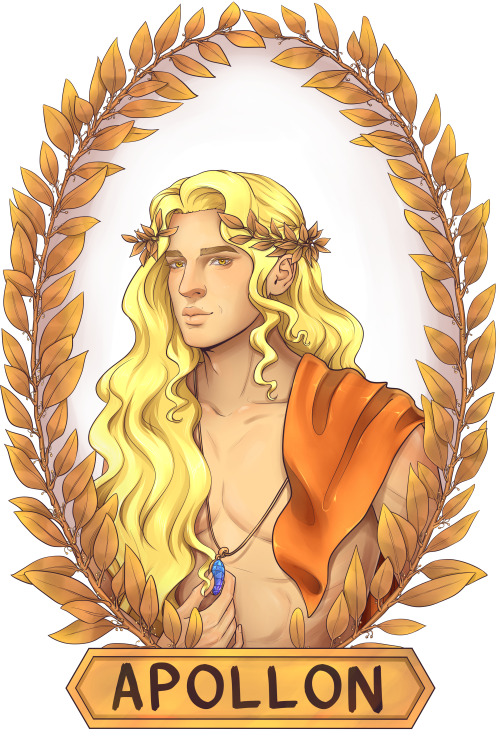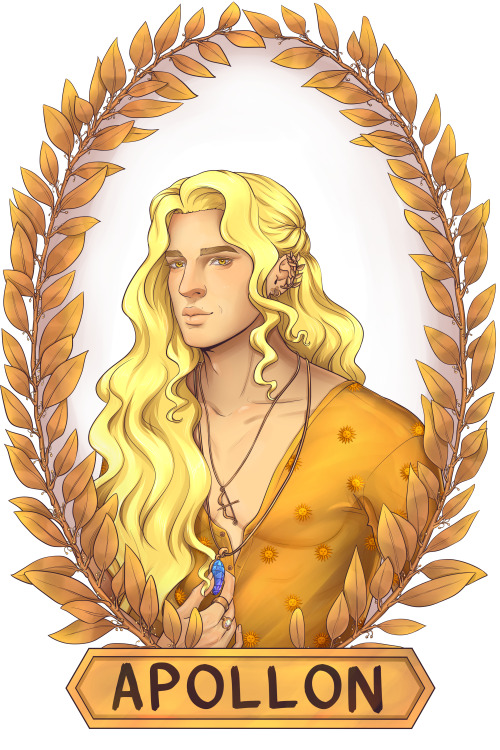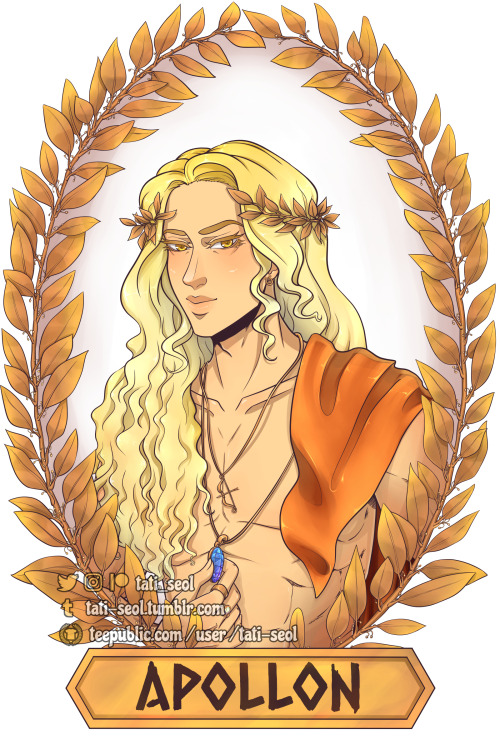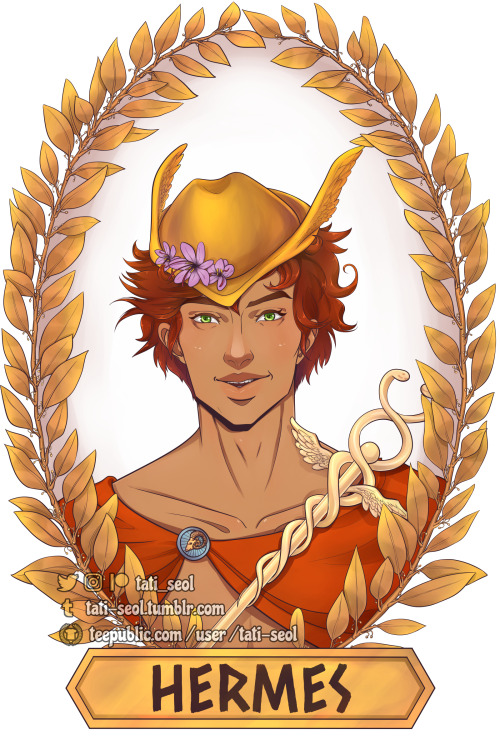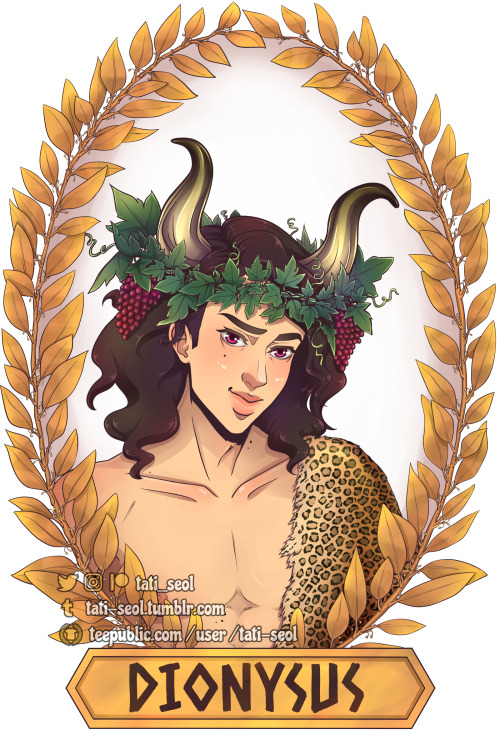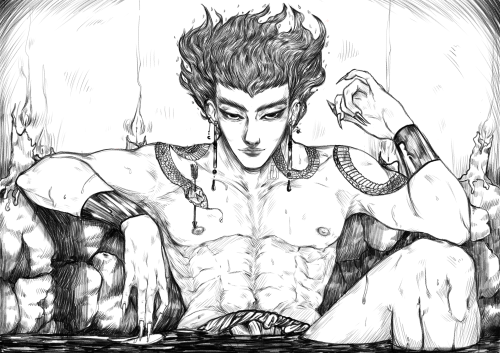#apollo
i just know apollo announced rachel would eventually be the new oracle and aphrodite was like “ooh wait but first a love triangle, that’s gonna spice up percy and annabeth’s relationship. maybe it’ll move faster.” and then later hephaestus was probably like “percy gonna die if we don’t help him get to safety after he blew up a mountain” and aphrodite was like “ooh send him calypso’s island, that’ll make annabeth and percy realize they’re meant to be”. And then hermes makes an offhand comment about luke asking annabeth to runaway with him and she’s like “ooh someone should mention that to percy”. i just have a feeling she was working extra hard trying to make those two realize they had feeling for each other, she was probably so frustrated that they didn’t realize that their jealousy was a part of them having feelings for the other.
✵ ✵
• Aromantic/Asexual.
• Starts a tree planting program.
• Frequently meets up with the girls from camp half blood but it makes her a little sad to see everyone around her age and pass, knowing she’s going to outlive them all.
• Nico is like a brother to her.
• Listens to an excessive amount of rock music.
• Even over her years as a Hunter of Artemis, she never changes her style.
• Vegetarian. Despite being tough af, she has a soft spot for animals and wants to help the planet.
• Every time she meets a new person she likes to casually bring up in conversation that she used to be a tree, then move on immediately, leaving them to be eternally confused.
• Picks up a hobby of fashioning weapons for the rest of the hunters.
• Doc Martens.
• Cargo pants.
• Corsets.
• Occasionally tries to levitate after Jason told her that he could, but never manages to get the hang of it.
• Her favourite food is birthday cake.
I’m not a classicist, but I suspect one of the reasons so many of the Greek gods are portrayed so unflatteringly was less because they were seen as villains than because they represented their domains. Of course Zeus sometimes misuses his power, that’s what a king does. Of course Artemis’s wrath is wild and painful, that’s what nature can be. Of course Hades snatched away a young girl from her mother’s arms, that’s what death does. This is one of the reasons callout posts for some gods comparing them negatively to ‘nicer’ gods are kind of missing the point.
I am no classicist either, but I’ll elaborate on this and touch on some other things we often ignore when reading Greek mythology. Most of us treat it as if Greek Gods and Greek mythology are one and the same, but the connection itself is not that simple.
What are the sources?
We push every written piece roughly from 800 BCE to 500 CE under the umbrella of “Greek Mythology”.
And I mean, every single piece.
It’s a huge chunk of time (1300 years!), with different cultural and political situations. We don’t think the same as folks from 1920s, why do we assume people from the 5th century CE would have the same views and values as people from the 8th century BCE.
Not only this, but we start to judge Gods on comedies, on satires, on tragedies, on all kinds of pieces of fiction. Yes, some of these were written by actual practitioners of Greek religion (who knew what their Gods were and were not), but somewhere on the way we all got very unlucky and the most popularized versions of myths turned out to be by a Roman guy who just wanted to cash out on lewd (and sometimes very gross)stories.
Also, people usually read (or watch) summaries. And here’s the thing. Summaries are mostly based on that Roman guy’s versions.
Moreover, there is this another guy, who had enough confidence to write “Read only my retellings of myths”. Guess what? We do! I’ve seen tons of summaries of his versions and they’re treated like the only versions in existence.
If you read his versions of myths side by side with earlier sources, you’ll quickly start to guess what he wrote in the other myth retelling.
Theoi website is very good for this since they have a lot of sources and fragments sorted by a specific theme and divine figure.
Villains vs Antagonist
Greek Gods were never villains in mythology, but antagonists. (Well, maybe except for Typhon). There’s the whole Hero-God antagonism, to the point of a hero looking very similar to the God they’re antagonistic with. Like Achilles and Apollo, Odysseus and Athena, Pentheus and Dionysus, etc.
So, in modern terms, they were partially just a plot device to make a “human” into an actual Hero. And, of course, into a cult hero, because they were worshipped, even though not on the same level as actual Gods. And often they were worshipped alongside the God/dess they were antagonistic with. We wouldn’t expect this if one party was a villain, right?
Even our perception of Hera as a jealous wife, who had to deal with her husband’s affairs, crumbles, when we think about her actions as a making of a Hero. We wouldn’t have so many heroes if it wasn’t for her. And heroes were a major part of Ancient Greek culture. I dare to say, without heroes Greece as we know it wouldn’t be the same. Heroes were kings and queens, skilled warriors, initiates of mystic cults, founders of nations. But would’ve they become as great if they had all the glory from the beginning? Or it’s thanks to Hera they overcame their obstacles and became Heroes?
Symbolism
We, as most of us are not Ancient Greek speakers, missing a lot of symbolism.
There’s a very common theme of making everything catastrophically wrongin myth, so we, as practitioners of religion in Ancient Greece (or modern practitioners now), would do everything right in real life. Every word and every action was so carefully chosen to reflect a mystic ritual, or even a common religious or social practice, without spelling out that it is, in fact, a ritual. While we treat it like stories, that thanks to these extreme metaphors and analogies can get really weird, a practitioner, especially initiated in a mystery cult, would treat it like a secret code. Why they did it this way? I don’t think we’ll ever find out!
Homeric Hymn 2 to Demeter, the one with the actual story about Demeter, Persephone, and Hades, is an example of it. It was a part of their mystery cult (Still is, if we assume the cult was operating without being public throughout the centuries, which is a possibility, and people reconstruct it in modern times, too). When we start looking for the meanings in it, we can easily see that it’s such a multidimensional story.
It’s cultural, as a marriage of a girl was often tied with death and lament. It also can be viewed as a mother’s attempt to deal with the sudden loss of their child. It can be interpreted as agricultural seasonal change, even though we tend to forget that actual seasons also exist in this pantheon. And it can be viewed as a romantic story, because love, especially the tragic one, is such a common theme in ancient Greek literature.
It can be extremely empowering, both from Demeter’s pov (as a mother who fights back for the right to see her daughter after she got married. Again, cultural thing), and Persephone’s pov (as a woman who turns a questionable or bad situation to her benefit).
We can interpret this story as the worst possible thing happening, or as the best story ever. Just don’t forget to give the same treatment to other myths as well, okay? It’s really not cool when people choose the best version of the myth (or even invent one) for one God, because it fits their interests, but then decide to choose the worst versions of myth for another God, just because.
Another thing to add here is that this particular myth centers around Demeter. Her feelings, her stress, her wanderings, her love for her daughter. Not around Hades, not around Persephone, or at least not to a degree in which we can sweep Demeter away as some background character that stands in a way of true love. Well, we can, but should we really?
I can’t stress enough that we treat the myths as literal most of the time, ignoring the fact that Gods are not… Physically humans? They’re not corporeal. Which is a hard concept to grasp since they are personified in myths.
But there’s this myth, for example, where Olympian Gods carry twenty (or twelve) daughters of Asopos away from him and “marry” them. But… Asopos presided over two huge rivers both called after him, and technically he was a literal river, a geographic place, not a human. His daughters are the smaller rivers that stem from him. And the whole act of “marriage” is just people founding cities in the banks of these rivers with certain Gods as their patrons. In one of the myths surrounding this, Zeus specifically throws a lightning bolt into Asopos who tries to get one of his daughters back. Is this a king misusing his power or a God of order taking action against something that tries to prevent an establishment of a city? Is it a description of natural phenomena, in which a river was averted from its unintended course by a bolt of lightning?
Should we call out a God for literally being a patron of a city? I doubt it.
From this perspective, it’s okay for us, in general, to not get it.When we read a myth for the first time there is no way we would know what it refers to, what its hidden meaning is, or who those people in the myth actually are. Especially, when the most obvious meaning for us reading the translations is not the one that was intended in Ancient Greek.
Butit’s not okay to attack Greek Gods and especially their followers based on myths, the meaning of which we, as individuals, might not understand completely.
Gods’ domains
Greek Gods are multidimensional and not just cookie cutters of their domains. In fact, no Olympian has strict one-domain boundaries. (I can’t say all Greek Gods, because there’s too many of them and I bet some actually have more or less strict boundaries)
So it’s really hard to say Artemis is wild and ruthless because of this one domain she rules over. Apart from nature, she’s also the Goddess of childbirth, of all things related to womanhood (except the lewd stuff).
But she can be angry and ruthless nevertheless, because she, even as a goddess, has feelings and consciousness. (Depending on your religious views, this still holds true both to Ancient Greek literature and to religion itself)
Compare her to Pan, a God more closely identified with nature and often described as wild and panic-inducing, but in 90% of myth he’s… Kind of just there, playing on his pipes or flute (and chilling with Ekho). Shouldn’t this difference show us that Artemis’ wrath in myth is there for a reason that we need to figure out? Sure, some stories may be cautionary tales of not going too far into the woods, but we can’t expect every single story about Artemis’ wrath to be about nature’s destructive powers.
Another problem is when we constantly dilute Artemis to a wee lesbian, Apollo to a femboy who writes bad poetry, Dionysus to a drunk party animal, Aphrodite to a vain beauty, Hades to a sad soft goth boy, and so on. We then get exceptionally surprised to find myths where they show not only their wrath but just any sort of emotion or action that doesn’t fit this box we put them into.
(Next point is kind of reaching, but it’s fun to think about)
The timeline
If we chose to judge Gods on myths (because that’s what we, as casual people, have access to) we’re also missing an important aspect of the timeline. We can argue that it doesn’t exist, but it’s there for us to decipher.
There are two major points that people are missing when talking specifically about how awful Zeus is, but they also concern other Gods in general.
Firstly,yeah he doesn’t do the baby-making thing anymore. Moreover, Gods stopped falling for mortals altogether for a reason. Aphrodite along with Eros used to make every God and Goddess fall for mortals, but there’s a myth in which she finally fell in love with a mortal herself. Why? Because Zeus had enough of this whole falling-in-love thing. Yeah, the same Zeus people love to hate on for being “too affectionate”. Thanks to this, Aphrodite realized that it’s really not fun to fall in love with a mortal so she promised to stop making Gods and Goddesses fall for humans. (Hint: it happened before the Trojan war) (It’s from Homeric Hymn 5 to Aphrodite. Very beautiful stuff and interesting to read too)
So, it’s really up to us to decide how to treat the myths about Gods’ mortal lovers after the Trojan war happened. Were they just made up so a person can look cooler as a king? (Looking at you, Alexander the Great) And if they weren’t, what about Aphrodite’s promise? We all know that nothing good happens when a God or a mortal breaks their oath. Is there maybe a deeper symbolism for this that we don’t notice because we read these texts as literal?
Secondly,there’s this goddess called Ate. She’s a personification of delusion, error, rash decisions. In Illiad, it is said that she is a daughter of Zeus, while Hesiod calls her the daughter of Eris, no father mentioned.
She had the power to lead both men and Gods down the path of ruin. When she tricked Zeus into making an oath that screwed Herakles’ future, he realized what is she capable of and banished her from Olympus. Do you know what that means? Illiad spells it out. Olympians used to be rash and making mistakes, but not anymore (or at least not to a catastrophic degree). And since this was mentioned in Illiad, we can place Ate’s banishing somewhere before the Trojan War, and after the birth of Herakles. So all the rash things and bad decisions happening during and after this were either caused by us, humans, because Ate is now with us, or we had much less catastrophic things happening with Gods, because, again, they still have their own interests and desires as conscious beings.
Conclusion
Greek Gods can be whatever we want them in myth and retellings because we write them. So wouldn’t it make more sense to say “This Roman guy sucks because he wrote such and such” instead of “This God/dess as a whole is bad (because of a few popular pieces that were written about them)”?
Judging a divine figure only by their domain or by the stories written about them without a full understanding of the purpose of these stories, and without consideration of historical and cultural influences on them, has little to no sense.
Even across Greek Mythology as a whole, there are sources that portray Gods and Goddesses with generally bad domains, as forces of justice, punishing those, who were indulging in the things they preside of. (Like a vase painting of Hybris, the goddess of insolence and excessive pride, where she was portrayed dressed as a Maenad, and described as an avenging spirit driving Dionysus to punish the hubris of men: https://www.theoi.com/Gallery/N21.1.html)
Classic Apollo VS Modern Apollo
According to my calendar today is Apollo’s birthday (Thargelion, 7th), so here’s a new drawing of him, in my current style.
You can buy both as a print here: https://www.teepublic.com/user/tati-seol
Post link

A Home in the Rough

